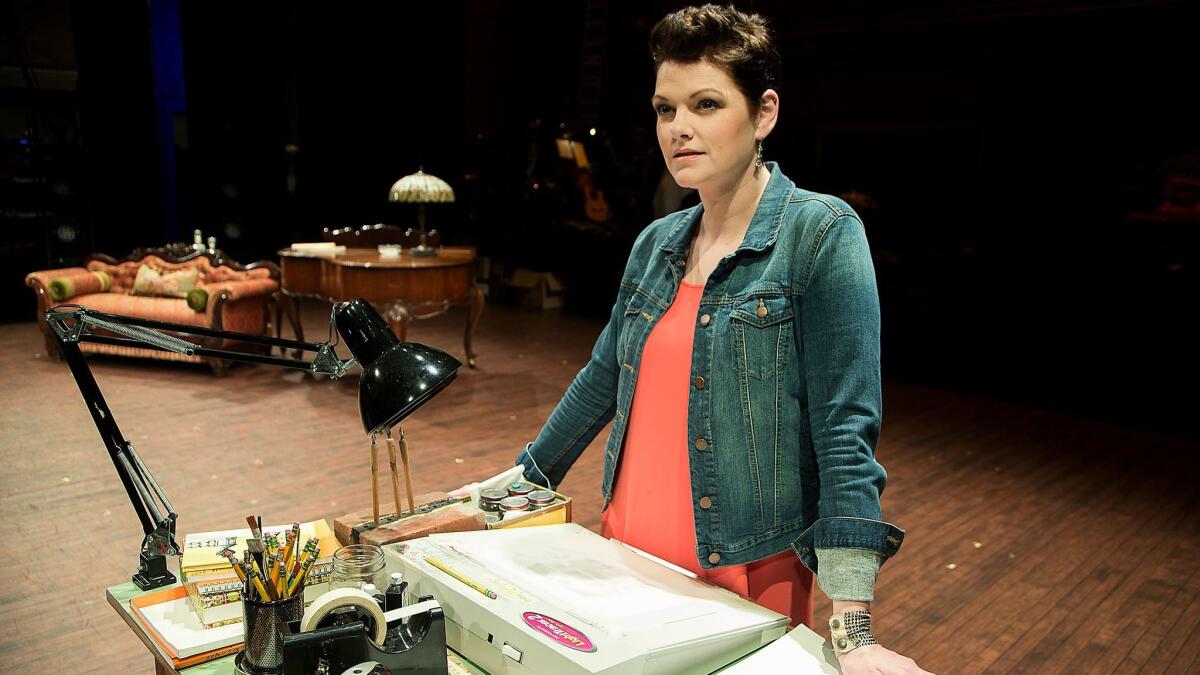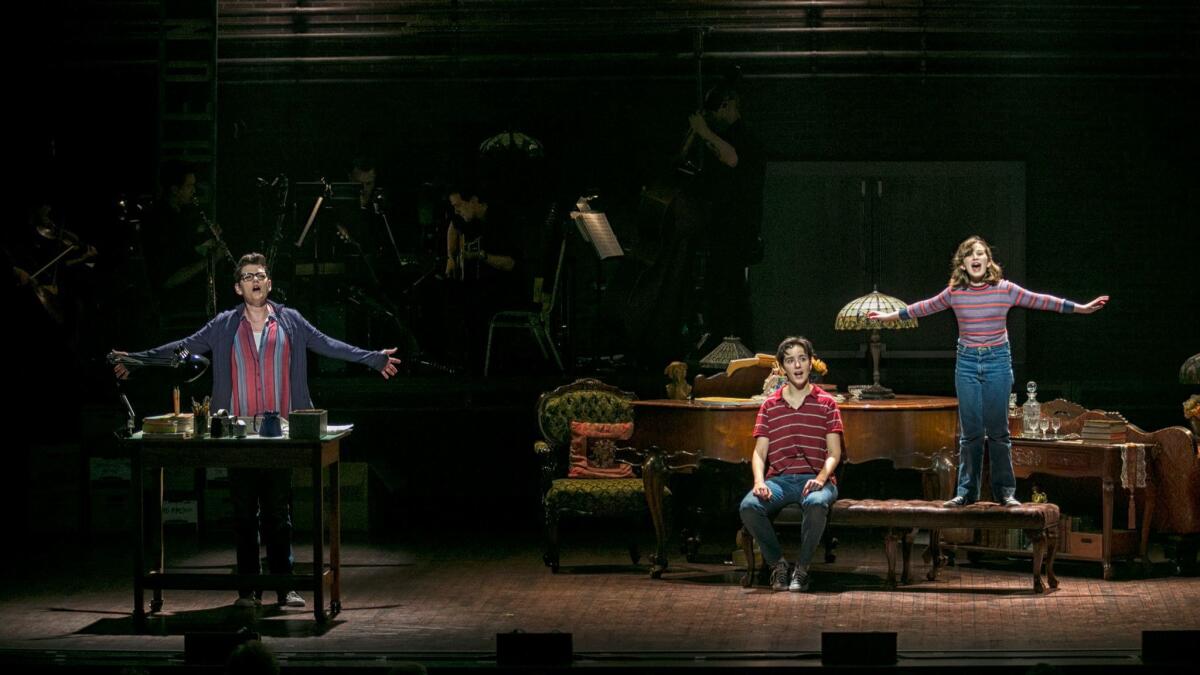‘Fun Home’ star and Actors’ Equity President Kate Shindle’s activist state of mind

Kate Shindle was performing concerts on a cruise ship in the Bahamas when the musical “Fun Home” opened on Broadway in 2015. The show won five Tony Awards that year, including best musical, but she had yet to see it.
Shindle was at the Tonys ceremony that year, and she could feel the importance of the moment — a win for that rare Broadway musical about the life of a lesbian, with a book and original score by two women. When she finally did see “Fun Home,” Shindle thought, “Oh, I’m gonna get that job.”
The character of Alison, a graphic novelist coming to terms with her sexuality and the death of her father, was enough to lure Shindle away from the plum gig that paid “an absurd amount of money” toward a role she felt destined to play.
Shindle tells that story sitting on a couch in the plush green room backstage at the Ahmanson Theatre, where “Fun Home’s” first national tour is running through April 1. It makes her laugh for good reason.
“I have made that decision about other things, and it doesn’t always work out,” she says.
Shindle is a hard-working actress who mostly cut her teeth in New York and regional theater; she knows what it feels like to go without work for months and months. But from time to time, things do have a way of coming together for her in remarkable ways.
Viewed in context, the positive happenings in Shindle’s life have less to do with luck and more to do with her driven personality and her passion for politics, art and activism, all of which she thinks about often and with intensity.
She was crowned Miss America in 1998, the first year she decided to seriously compete for the title. And she was voted president of the Actors’ Equity Assn. in May 2015 — the youngest person and only the third woman to hold the office for the labor union, which represents more than 50,000 actors and stage managers nationwide.
Ultimately, being Miss America gave me access to parts of America that most AIDS activists couldn’t get into, and I was profoundly happy about that.
— Kate Shindle
She has landed roles in two other national tours, including Sally Bowles in “Cabaret,” but “Fun Home” marks the first time she has taken a national tour out from the rehearsal room, and it’s certainly the largest tour she’s done, with some long, luxurious six-week stops.
She realizes the privilege of this position, calling it “100% awesome.” It makes her reflect on the 99-seat theater controversy that has roiled the Los Angeles scene since a month before she took office at Equity.
The 99-Seat Agreement, which the union passed, covers local companies performing in L.A. County theaters with fewer than 100 seats. The change required small companies to increase actor pay from a tiered stipend (often $7 to $25 per performance) to a minimum hourly wage for all work, including rehearsals as well as time spent on set for performances. After an extended battle, the changes took effect Jan. 1 of this year.
As some theaters scramble to adjust to the new normal, the jury remains out about whether the agreement will effectively kill small-theater life in the city, as opponents fear.
Although Shindle realizes she’s speaking from a privileged perch inside one of the city’s largest, most esteemed and well-funded theaters, she has fond memories of doing a 99-seat show at the Blank Theatre in Hollywood in 2002 while she was in town for pilot season.
“That show saved my sanity,” she says. “I believe small theater reminds people that they are, in fact, actors, even if they’re not getting TV auditions at that particular moment. It gives them a chance to do what they love.”
On the other hand, for a union, the idea that actors should not aspire to a living wage is a bitter pill to swallow, she says. The compromise Equity made, Shindle adds, was to create membership rules that effectively provide wage requirement exemptions for more than 70% of the regularly producing 99-seat theaters in the county.
To these companies, many of which worry that the exemption could be rescinded at any moment, Shindle would like to say: “If anyone even brings up starting to move the membership companies out of that waiver before the end of my first term [in 2018], and if I’m re-elected, before the end of my second term, I’m going to smack them in the head. We have to let this settle … and we have to be sensitive to the fact that we’re all artists.”
Shindle is not one to mince words — a quality that made her a particularly unusual Miss America. She was more interested in her cause of choice than in signing autographs, which made her want to “stab myself in the eyes with a fork.”
Her cause was HIV/AIDS prevention and education, and she devoted her reign to it via appearances at places like high schools, state assemblies and food pantries.
“Ultimately, being Miss America gave me access to parts of America that most AIDS activists couldn’t get into, and I was profoundly happy about that,” she says. “It seemed ridiculous that we knew how to stop the spread of it but we weren’t because people didn’t want to talk about the things that spread it.”
After her term as Miss America was up, she finished her senior year at Northwestern and moved to New York to make a career in acting. Being a former Miss America sometimes helped and sometimes didn’t. She remembers a director once scanning her resume and noting the Miss America mention in a way that made her feel positive she wouldn’t get the role.
Still, one part led to another, and she carved out a living that turned into a good life.
“I have zero complaints,” she says. “There are challenges, but I’m a pretty happy actor right now.”

Adding to her sense of accomplishment is her feeling that “Fun Home” is particularly important in the current cultural climate. The musical is based on a graphic-novel memoir by Alison Bechdel, and it chronicles three stages of her life and the challenges she faced growing up gay in a family ruled over by an often-tyrannical father who turns out to be a closeted gay man who eventually commits suicide. Shindle plays Alison during her third stage of life — when she’s a grown woman reflecting on the family drama.
“I feel like there’s a real risk of burnout talking about politics all the time, and we’re going to have to adjust to that,” Shindle says. “In the meantime, the idea that you have to recognize your own identity, and that bad things can happen when you’re not permitted to, is a message that I think is awfully relevant.”
Shindle’s zest for politics is palpable to those who work with her in “Fun Home,” says actress Abby Corrigan, who plays Middle Alison during her super-awkward teen phase.
“She’s very analytical and smart,” Corrigan says of Shindle. “Whenever she overhears a conversation and she’s passionate about it, she’ll pop right in. It’s never small talk.”
The same can be said of Shindle when she’s being interviewed. She likes to talk about big themes and big ideas. For now, a show like “Fun Home” is the perfect package, representing everything she loves about being an actor and an activist.
♦ ♦ ♦ ♦ ♦ ♦ ♦ ♦ ♦ ♦
‘Fun Home’
Where: Ahmanson Theatre, 135 N. Grand Ave., Los Angeles
When: 8 p.m. Tuesdays-Fridays, 2 and 8 p.m. Saturdays, 1 and 6:30 p.m. Sundays; ends April 1 (call for exceptions)
Cost: $25-$125 (subject to change)
Info: (213) 972-4400, www.centertheatregroup.org
Running time: 1 hour and 40 minutes, no intermission
ALSO:
Review: ‘Fun Home’ weaves tragedy and comedy into an original American musical
‘Fun Home’ composer Jeanine Tesori hears the music in everyday life
Diego Rivera’s Cubist masterpiece arrives at LACMA
At the Hammer Museum, Jimmie Durham’s art throws some well-aimed stones
This female photographer’s goal? To change perceptions of black men
More to Read
The biggest entertainment stories
Get our big stories about Hollywood, film, television, music, arts, culture and more right in your inbox as soon as they publish.
You may occasionally receive promotional content from the Los Angeles Times.











